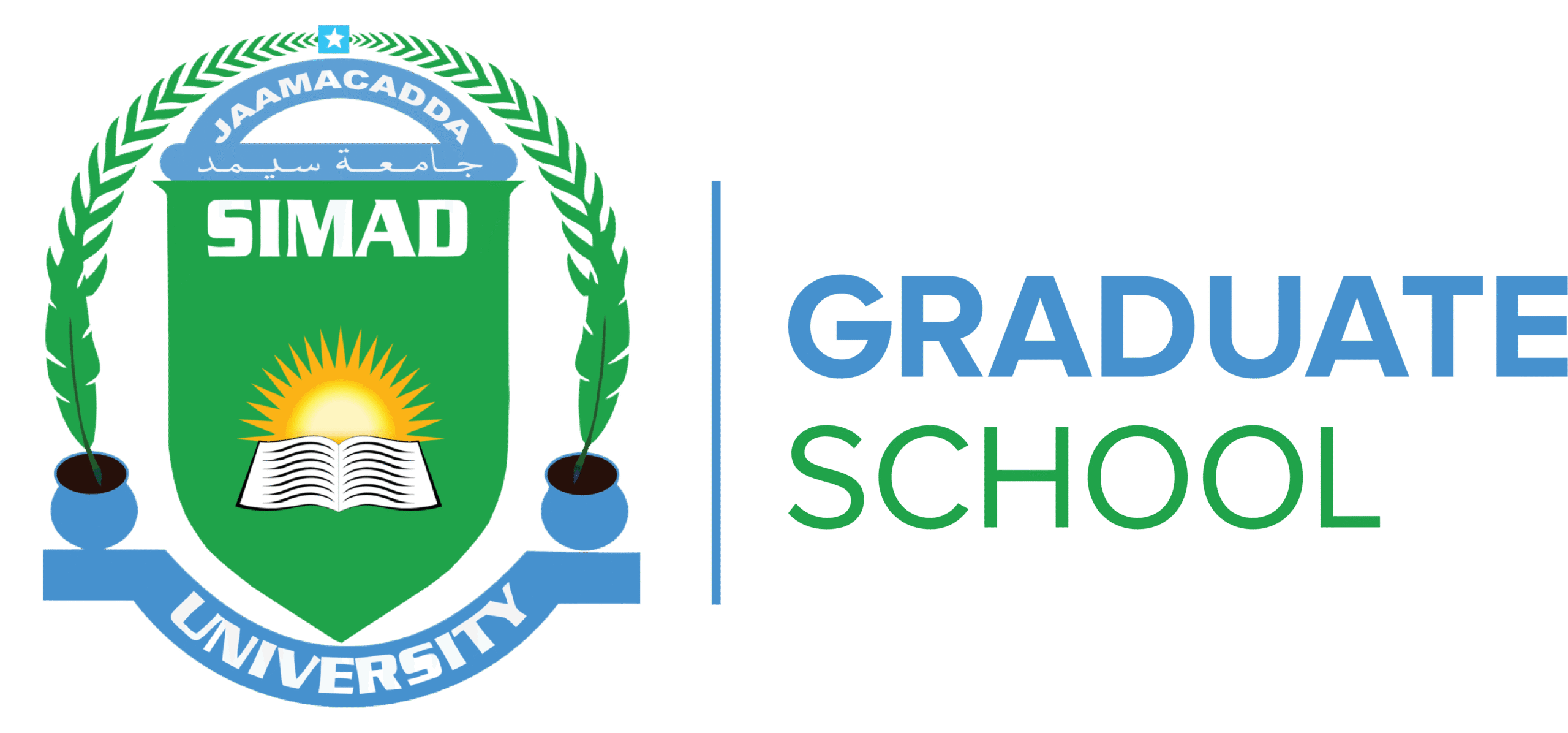Home
Programs
Master of Arts in Economics
Master of Arts in Economics
The Master of Arts in Economics at SIMAD University is designed to produce critical and analytical graduates capable of holistically analyzing complex economic problems.

Introduction
The Master of Arts in Economics at SIMAD University is designed to produce critical and analytical graduates capable of holistically analyzing complex economic problems. This program offers students opportunities to develop crucial analytical, practical, and interpersonal skills for sound managerial decision-making in an increasingly complex economic and financial environment. The curriculum emphasizes advanced economic theories, technical competency for specialized research, and high integrity and responsibility in policy-making and implementation.
Program Objectives
Upon completion of the Master of Arts in Economics, graduates will be able to:
- Demonstrate understanding of advanced economic theories.
- Analyze economic problems using cutting-edge analytical techniques.
- Determine appropriate methodology in evaluating economic issues.
- Communicate economic theory, policy, and analysis effectively.
- Use competently a wide range of digital resources and mathematical techniques.
Job Perspectives
Graduates of this Master of Arts in Economics, particularly with the specialized knowledge gained, are prepared for challenging careers and Leadership roles in economics within an increasingly global economic and financial environment. Potential career paths, as indicated for Chartered Economists, which graduates are eligible to pursue, include roles in:
- Governmental Programs
- Financial Institutions
- Petroleum Organizations
- Management positions of corporate bodies
- Non-governmental organizations
Opportunity to be a Chartered Economist (Ch.E.)
SIMAD University’s Faculty of Economics has been officially recognized and approved as a partner of the Association of Certified Chartered Economists (ACCE) in Somalia, a constituent of the Global Academy of Finance and Management (GAFM®). This alliance offers significant benefits to master’s degree graduates from SIMAD University, including:
- Graduates can apply directly to the ACCE Board of Standards for Certifications, Charters, and Designations.
- Master’s degree graduates will receive exclusive gateway to become certified chartered economist.
- Master’s degree graduates will be exempt from all Fundamental Level, Part I, Part II, and Part III courses of the ACCE program. They will only be required to sit for the two specialization courses.
- SIMAD University has been designated as an examination center for ACCE student members in Somalia.
- Specializations/ Designations available at ACCE are the following:
- Chartered Petroleum Economist – Ch.PE
- Chartered Financial Economist – Ch.FE
- Chartered Economic Policy Analyst – CEPA
- Chartered Health Economist – Ch.HE
- Chartered Energy Economist – Ch.EE –
- Chartered Managerial Economist – Ch.ME
- Chartered Industrial Economist – Ch.IE
Exam Regulations
Assessment emphasizes both continuous learning and summative evaluation. Typical components and indicative weight ranges include participation (5–10%), assignments (15–20%), group projects/presentations (15–25%), case analyses (10–15%), and final examinations (20–30%). The capstone/research component is assessed independently (100% of its 6 credits). Many course outlines specify that students must pass both midterm/continuous assessment and the final exam to pass the course (commonly 60% coursework, 40% final). Progression follows successful completion of semester requirements and maintenance of satisfactory standing per university policy.
Award of the Degree
To be awarded the Master of Arts in Economics, a candidate must:
- Complete core, specialization, electives, and thesis with the minimum GPA required.
- Satisfy ethical and research compliance requirements.
- Demonstrate English proficiency (B2 via Linguaskill or approved IELTS/TOEFL).
- Clear all financial and administrative obligations.
The Master of Arts in Economics at SIMAD University is designed to produce critical and analytical graduates capable of holistically analyzing complex economic problems. This program offers students opportunities to develop crucial analytical, practical, and interpersonal skills for sound managerial decision-making in an increasingly complex economic and financial environment. The curriculum emphasizes advanced economic theories, technical competency for specialized research, and high integrity and responsibility in policy-making and implementation.
Core | ||
Code | Course | CU |
ECO7101 | Microeconomics Theory | 3 |
ECO7102 | Macroeconomics Theory | 3 |
ECO7103 | Mathematical Economics | 3 |
ECO7201 | Econometric Methods | 3 |
ECO7202 | Research Methodology | 3 |
ECO7203 | Economic Policy Analysis | 3 |
Elective Courses | ||
ECO7301 | International Economics | 3 |
ECO7302 | International Trade | 3 |
ECO7303 | International Finance | 3 |
ECO7304 | Financial Economics | 3 |
ECO7305 | Monetary Economics | 3 |
ECO7306 | Applied Financial Econometrics | 3 |
ECO7301 | Labor Economics | 3 |
ECO7401 | Advanced Applied Econometrics | 3 |
ECO7402 | Applied Time Series Analysis | 3 |
ECO7403 | Development Economics | 3 |
ECO7404 | Environmental Economics | 3 |
ECO7405 | Managerial Economics | 3 |
ECO7406 | Industrial Economics | 3 |
Applicants must:
- Hold a recognized bachelor’s degree in business, economics, or a related field (minimum GPA 2.5).
- Provide evidence of professional experience (preferred but not mandatory).
- Semester Fees: USD 475
- Tuition Fees: USD 2,850 for two years
- The school has three intakes
- January, May, September
